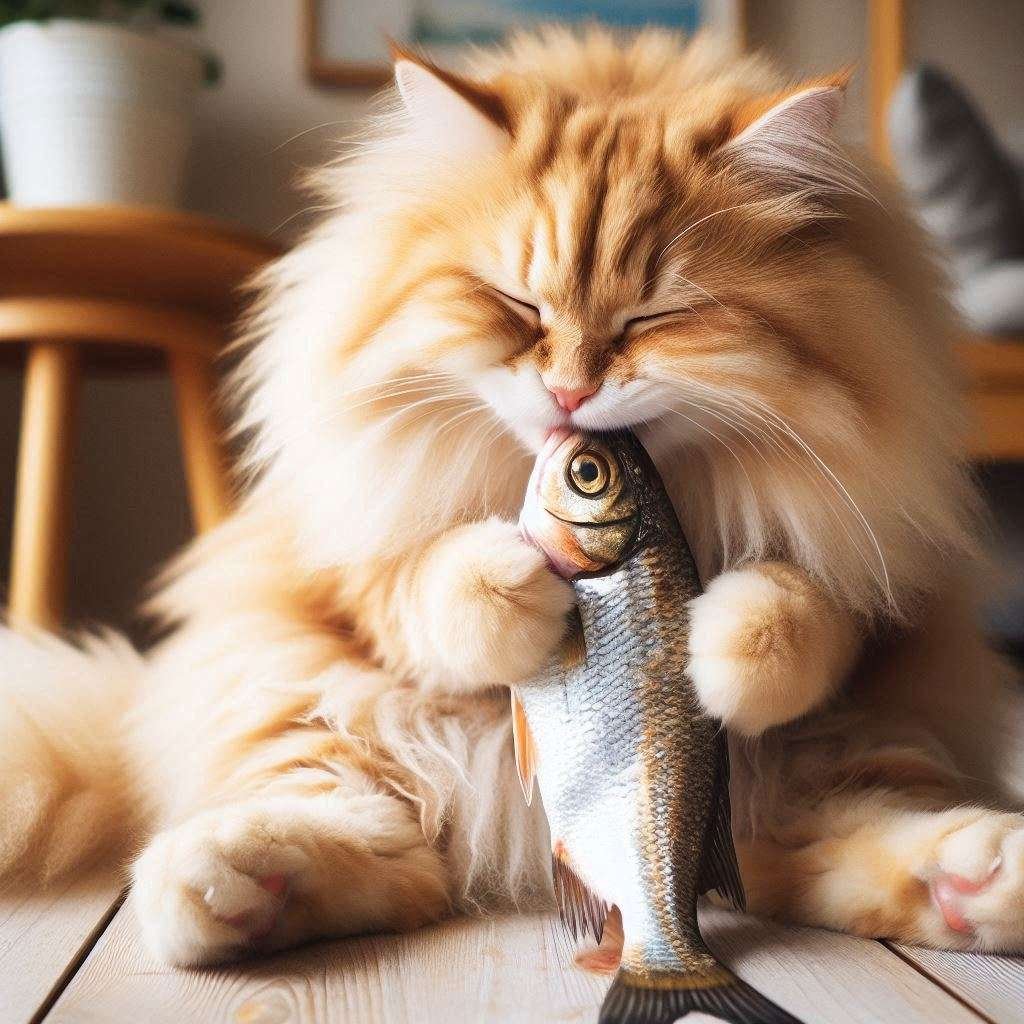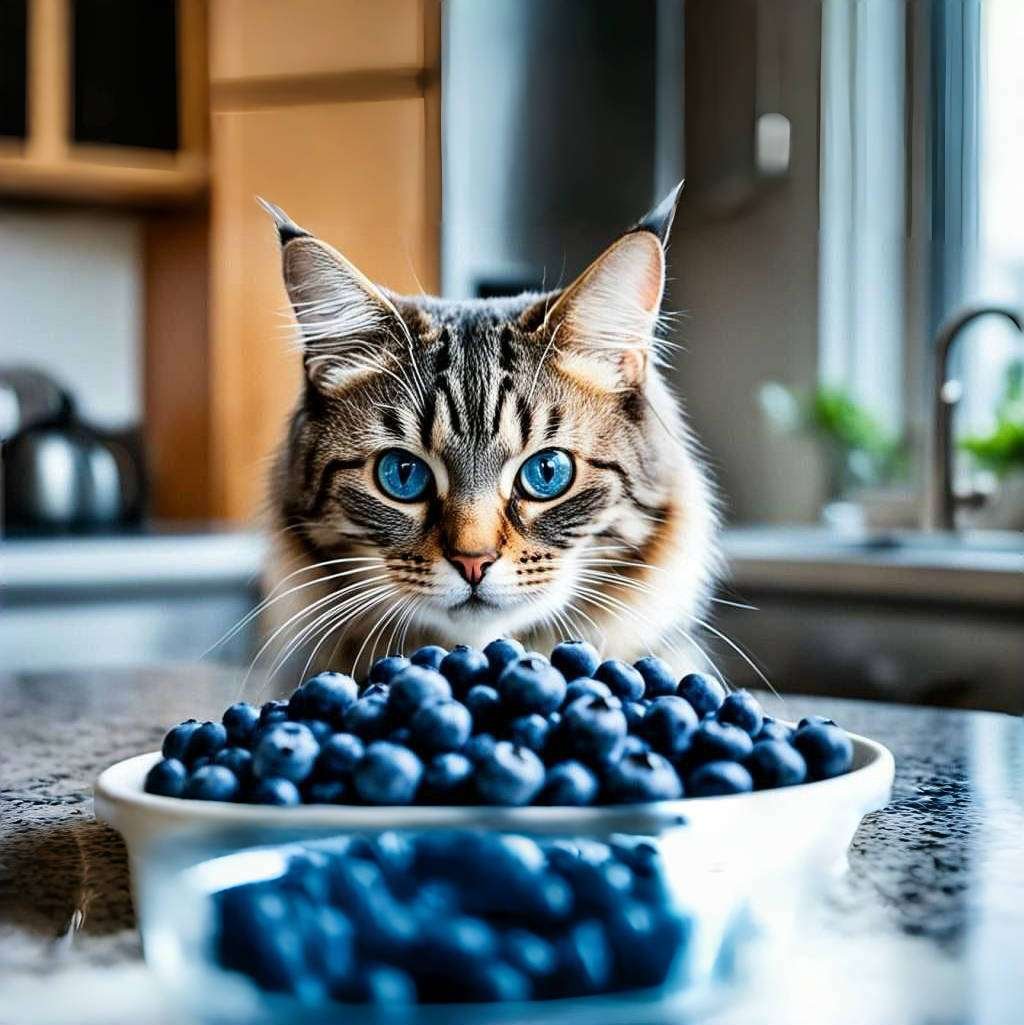Many people wonder if cats can eat apples, a favorite fruit for humans. The good news is that cats can have apples in small amounts. But, it’s important to know the risks and what to consider before giving them to your cat. Can cats eat apples?
Apples have cyanide in their stems, leaves, and seeds, which is bad for cats if eaten too much. They also have a lot of sugar, which can be bad for cats with diabetes or weight problems. Knowing the good and bad of giving apples to cats helps decide if it’s a good treat for your pet.
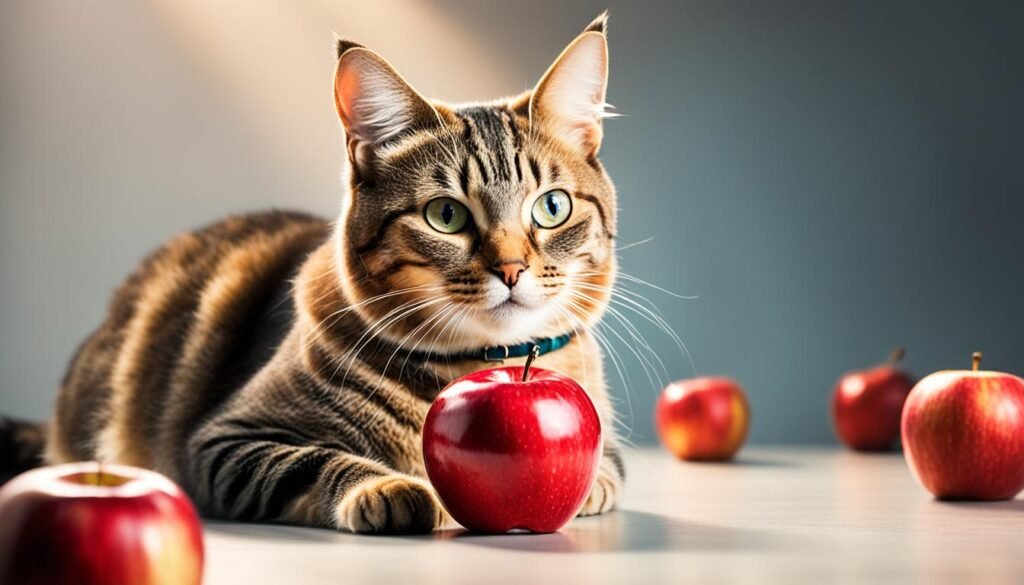
Key Takeaways
- Cats can eat small pieces of apple flesh as an occasional treat, but the stems, leaves, and seeds contain cyanide and should never be fed to cats.
- Cooked apples without added ingredients are generally safe for cats, but the type of apple should be chosen carefully.
- Dried apples and apple-based products like applesauce and juice are not recommended for cats due to their high sugar content.
- Overfeeding apples to cats can lead to digestive issues, as they are high in fiber and natural sugars.
- Apples should only make up a small portion (up to 10%) of a cat’s diet, with the majority of their nutrition coming from a balanced, meat-based cat food.
Can Cats Eat Apples?
Apples are mostly safe for cats in small amounts. But, pet owners should know the risks. Cats need a meat-based diet because they are obligate carnivores. Apples and other fruits don’t give cats much nutrition.
The Risks of Feeding Cats Apples
Apples have cyanide in their stems, leaves, and seeds. This can be harmful to cats if they eat too much. Eating many apples can cause vomiting, diarrhea, and mess with their blood sugar, especially for cats with diabetes.
Apples are high in sugar. So, they’re not good for cats with obesity or diabetes. They shouldn’t make up more than 10% of their daily calories from treats.
Signs of Apple Toxicity in Cats
- Nausea
- Difficulty breathing
- Seizures
Over seven million cats and dogs get sick from eating something toxic each year. Cats are at risk from apple toxicity. The cyanide in the stems, leaves, and seeds can make them breathe fast, drool, and vomit.
Apples can be a rare treat for cats, but only in small amounts. Avoid giving them the stems, leaves, seeds, and core. Homemade applesauce or natural apple juice is safer. But, always talk to a vet before adding new human foods to their diet.
Are Apples Good for Cats?
Apples might seem like a safe snack for our furry friends, but pet owners should be careful. Cats are obligate carnivores, needing a diet mainly of animal proteins. Apples have some good vitamins and minerals, but they don’t give cats what they need nutritionally.
Here are some things to think about when giving apples to cats:
- A good amount of plain apple for cats is 1 to 3 teaspoons, given once or twice a week. Kittens can have a tiny bit of mashed apple or applesauce, but watch for any bad reactions.
- Apples are mostly water, which can help keep cats hydrated if they’re not drinking enough, especially if they eat mostly dry cat food.
- The soluble fiber in apples helps with digestion. It makes a gel in the GI tract, which helps with regularity and makes stool better in cats.
- Small amounts of apple can make cats less bored by offering a new taste and texture. It can also make them play more and stop doing bad things.
Apples aren’t a must-have in a cat’s diet. They don’t give cats the nutrients and protein they need. So, give apples to cats as a rare treat, not as a regular food.
| Nutritional Benefits of Apples for Cats | Potential Drawbacks of Apples for Cats |
|---|---|
|
|
In conclusion, apples are better thought of as a cat treat than a key food. Always be careful with how much you give them, and talk to a vet before adding new foods to your feline friends.
Nutritional Value of Apples for Cats
Apples have some good stuff for cats, but they’re not a big deal nutrition-wise. They’re packed with fiber, which helps with digestion. But, cats get enough fiber from their regular food. Apples also have vitamins and minerals like Vitamin C, Vitamin K, and antioxidants. Yet, these aren’t as crucial for cats as proteins and fats.
Fiber Content in Apples
Apples are full of fiber, which is great for a cat’s gut. But, cats get enough fiber from their food. So, apples are more of a treat than a main food source. It’s important to feed them apples in small amounts to prevent stomach problems.
Vitamin and Mineral Content in Apples
Apples have lots of vitamins and minerals, like Vitamin C, Vitamin K, and antioxidants. These can be good for health, but they’re not as important as proteins and fats for cats. Cats need a diet mainly based on meat for their health.
The nutritional benefits of apples for cats are pretty small. They shouldn’t be a big part of a cat’s diet. Apples can be given as a special treat, but they shouldn’t take the place of the important nutrients cats need from their regular food.
How to Feed Apples to Cats Safely
If you want to share apples with your cat, do it safely and in small amounts. First, wash the apple well and take out the stem, seeds, and core. These parts have cyanide, which is bad for cats. Cut the apple into small pieces so your cat can chew and digest them easily.
Preparing Apples for Cats
Start with just one or two small apple pieces and watch your cat for any signs of upset. Apples should not be more than 10% of your cat’s daily calories. Eating too much can cause stomach problems and weight gain.
Portion Control for Cats and Apples
- Cats don’t really like sweet foods, including apples.
- Apples should not be more than 10% of a cat’s daily calories, says the University of Missouri Small Animal Clinical Nutrition Service.
- A big apple has about 130 calories. Use this to figure out how much is right for your cat based on their daily needs.
Talking to your vet before giving your cat new foods is a good idea, especially if they have health issues like diabetes. Cats have different calorie needs and ideal weights. So, think about their specific needs when giving them apples or other treats.
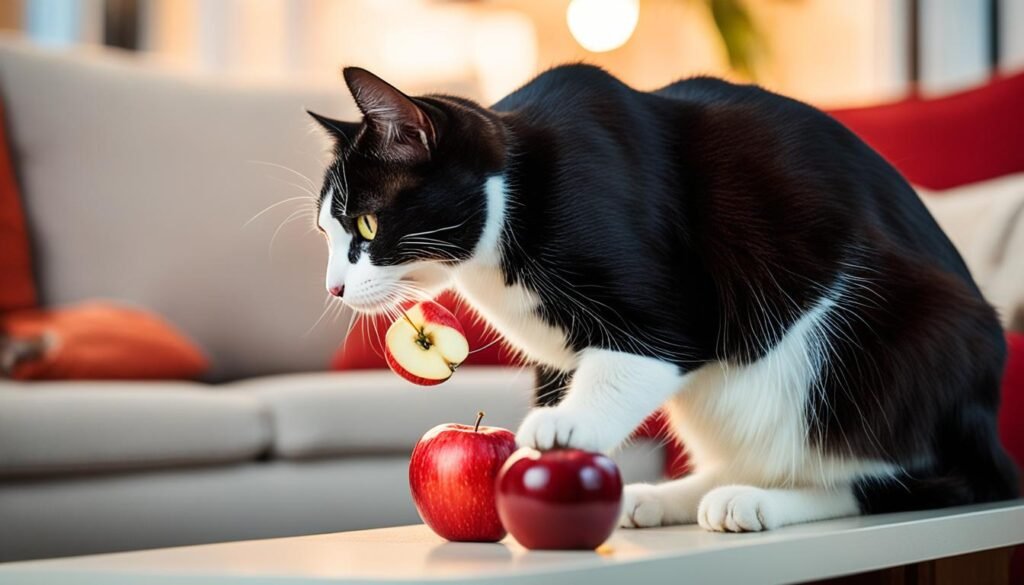
“Treats should not account for more than 10 percent of a cat’s daily caloric intake.”
Introducing new foods one at a time can help find the cause if your cat has a bad reaction. Watching how your cat reacts and being careful with how much you give are important for safely feeding them apples and other human foods.
Other Fruits Cats Can Eat
Apples might not be a must-have for cats, but other fruits are okay in small amounts. Bananas are great for cats because they’re full of potassium and fiber. Strawberries are also good, loaded with antioxidants and vitamin C.
Bananas for Cats
Bananas are safe for cats to eat in small amounts. They’re packed with potassium, which keeps blood pressure and muscles healthy. Bananas also have fiber, which helps with digestion. When giving bananas to your cat, start with a little and watch how they react to avoid any stomach problems.
Strawberries for Cats
Strawberries can be a healthy snack for cats too. They’re full of vitamin C and antioxidants, which boost the immune system and fight inflammation. But, don’t give them too many because of the sugar. Always start with a little and talk to your vet about how much is right.
Remember, fruits can be a tasty and healthy treat for your cat. But always check with your vet before adding new foods, like fruits, to their diet. They can give you the best advice for your cat’s health and happiness.
Fruits to Avoid Feeding Cats
Some fruits are okay for cats in small amounts, but many should be avoided. Grapes and raisins are very toxic and can lead to kidney failure. Citrus fruits like lemons and limes can upset a cat’s stomach with their acidity.
Dried fruits are often high in sugar, which is bad for cats. Always check with a vet before giving your cat any fruit as a treat.
Eating too much cyanide from apple seeds can cause fast breathing, drooling, and vomiting in cats. Cats should get no more than 10% of their daily calories from treats to prevent diabetic issues from too much sugar.
- Cats are obligate carnivores, needing meat for their diet; fruits should be rare treats.
- Commercial applesauce might have extra sugar from corn syrup, so choose unsweetened applesauce as a treat.
- Cats need a balanced diet; their digestive system is made for protein and fat, not raw carbs.
Always put your cat’s health and safety first when choosing their food. Talk to your vet to make sure you’re giving your cat the right food and avoiding toxic foods.
“More than seven million cats and dogs have fallen ill after eating something toxic, showing how important it is to watch what pets eat.”
Apple Products Unsafe for Cats
Fresh apple flesh can be a safe treat for cats in small amounts. But, some apple products are not safe for them. This includes applesauce and apple juice, which can be harmful.
Avoiding Applesauce and Apple Juice
Applesauce often has added sugars, spices, and preservatives. These can upset a cat’s stomach and cause health issues. Apple juice is also too sweet for cats and can lead to digestive problems.
It’s best to give your cat small pieces of fresh, plain apple now and then. Avoid giving them applesauce or apple juice. Cats should only have a little bit of human food, like apples, as a special treat.
Vets say to introduce new foods slowly to prevent stomach upset. They also suggest giving cats different human foods in small amounts to see what they like. Some cat foods even have healthy ingredients like spinach and blueberries.
| Apple Product | Suitability for Cats |
|---|---|
| Fresh Apple Flesh | Occasional Treat |
| Applesauce | Avoid |
| Apple Juice | Avoid |
Remember, only give cats human food in small amounts. Stick to fresh apple and avoid applesauce and juice. This keeps your cat safe and healthy.
Can Cats Eat Apples?
Cats can have apples in small amounts. These fruits give them fiber, vitamin A, and vitamin C. They also help cats stay hydrated, which is good in hot weather. But, pet owners should watch out for parts of the apple that could be bad for cats.
The seeds, core, and stems have cyanide, which is bad for cats. Signs of cyanide poisoning include trouble breathing, big pupils, and serious health issues. Also, applesauce and apple juice can have extra sugars that upset a cat’s stomach.
It’s best to give cats small, raw, organic apple pieces. Cooked apples might be okay for some cats but can make others sick. Always wash the apples, peel them, and take out the seeds and core. Cut them into small pieces to avoid choking.
Cats need meat for their diet mainly. Apples can be a rare treat, but they shouldn’t make up more than 10% of their daily food. Too much sugar can lead to health problems like diabetes in cats.
Before giving cats new foods, talk to a vet to make sure it’s safe for them.
“Apples can be a safe and healthy treat for cats in moderation, but pet owners must be mindful of the potentially toxic parts of the fruit and monitor their cat’s intake closely.”
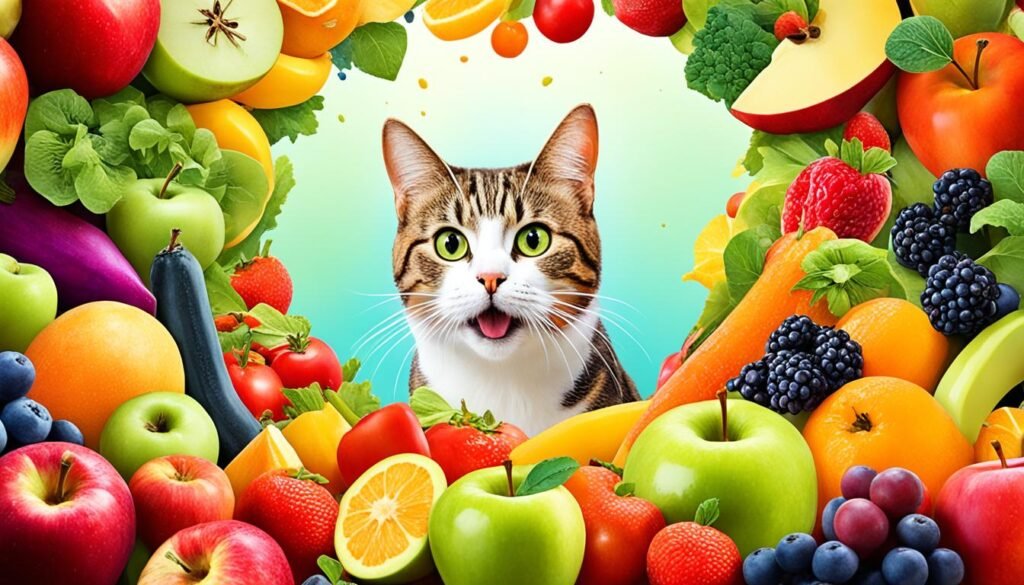
| Nutrient | Benefits for Cats |
|---|---|
| Fiber | Promotes digestive health and regularity |
| Vitamin A | Supports immune function and vision |
| Vitamin C | Helps with wound healing and antioxidant protection |
Consulting a Veterinarian
When you want to add new foods, treats, or supplements to your cat’s diet, talk to a consulting veterinarian. They can give you advice on what foods are safe and right for your cat. This depends on their age, health, and diet needs.
Your cat health and pet safety are very important. A vet can tell you the right amount and how to prepare food for your cat. This is key if your cat has health issues that could be worsened by certain foods.
Getting advice from a consulting veterinarian is the best way to make sure your cat’s diet is good for them. They can help you understand your cat’s cat diet needs. They’ll give you specific advice to keep your cat healthy.
“Your veterinarian is the ultimate resource for ensuring your cat’s dietary needs are met in a safe and healthy manner.”
Always choose safety for your cat’s cat health and safety. Your vet can help you make the best choices. They’ll keep your cat happy and healthy.
Healthy Cat Treat Alternatives
Apples aren’t the best choice for cats, but there are many healthy alternatives. You can give your cat small amounts of cooked chicken or turkey. Freeze-dried meat treats and cat-safe veggies like carrots or green beans are also good. Plus, there are natural cat treats available in stores.
When picking treats, look for ones low in sugar and made for cats. The Cornell Feline Health Center says raw, peeled apple slices can be a healthy snack. They offer fiber, vitamin A, and vitamin C. But, don’t give them the core, seeds, or stem because they have cyanide, which is bad for cats.
Always talk to your vet before trying new treats on your cat. They can tell you which ones are safe and right for your cat. They’ll also help you know how much to give to keep your cat healthy.
Healthy Cat Treat Options
- Cooked, boneless chicken or turkey
- Freeze-dried meat treats
- Cat-safe vegetables (carrots, green beans)
- Commercially-produced natural cat treats
- Ripe, fresh pineapple (in moderation)
- Pumpkin (low in calories, high in fiber)
| Treat | Benefits | Precautions |
|---|---|---|
| Apples (peeled, no seeds/core/stem) | Fiber, vitamin A, vitamin C | Cyanide in seeds, core, and stem can be toxic |
| Bananas | Potassium, vitamin B6 | High in sugar, may cause digestive issues |
| Watermelon | Vitamins, minerals, hydration | High natural sugar content, can cause digestive upset |
Treats should only be 10% of your cat’s daily calories. Always control how much you give to keep your cat healthy. Talk to your vet before adding new foods or treats to your cat’s diet.
Conclusion
Cats can safely eat apples in small amounts, but they don’t get much nutrition from them. Cats need animal-based protein to stay healthy. Feeding them apples can cause stomach problems and even be toxic if they eat the stems, leaves, or seeds.
Apples should be given as an occasional treat, not a regular food. Always introduce new foods slowly and with your vet’s advice. This keeps your cat safe and healthy. There are many safe treats for cats that are better than apples.
A balanced diet is key for a cat’s health and growth, especially for kittens. Knowing about can cats eat apples, feline diet, fruit safety, apple nutrients, pet care, and cat health helps you make good choices for your cat. This ensures they live a healthy and happy life.

